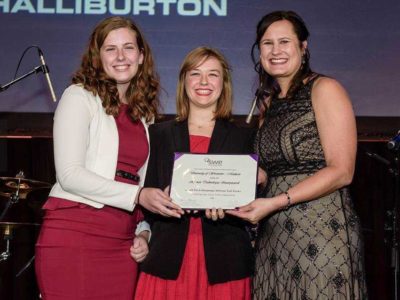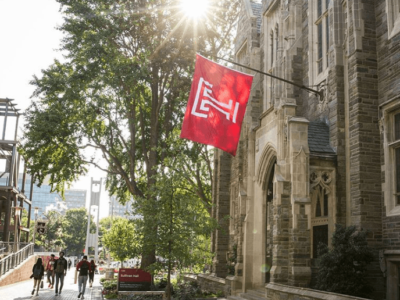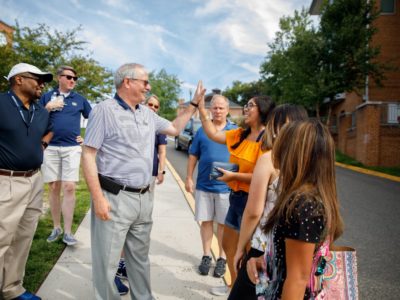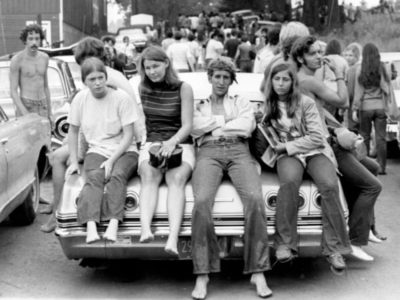With so much great leadership already on the UW-Madison campus, students have no need to look to corporate big-wigs or celebrity idols for inspiration. Organizations ranging from the Society of Women Engineers to Hollywood Badgers impact students in ways that are often taken for granted, and it can be easy to forget that these clubs don’t run on their own.
Check out 10 influential UW-Madison students taking charge on their campus.
1. Sydney Katuszonek ‘18 – Chapter President of Habitat for Humanity

Senior Sydney Katuszonek, chapter president of Habitat for Humanity at UW-Madison, holds fundraising events for the campus branch of the organization to reach their goal of building 30 local homes a year. Katuszonek doesn’t shy away from getting her hands dirty. Instead, she chooses to immerse herself in extensive—and sometimes out-of-state—building projects. In fact, you can find her happily digging away at new foundations and literally getting dirt on her hands for projects such as the one in Taos, New Mexico, pictured above. “You really develop a family in the club,” Katuszonek said. Hard work, whether in class or Taos, New Mexico, can make for a great bonding experience. Instead of focusing on the difficulty of the task, take Katuszonek’s perspective and focus on what it helps you to accomplish.
2. Eliza Weisberg ‘18 – Co-President of Madison Undergraduate Society for English (MUSE)

You can’t deny that having a sense of community helps to create an academic support network, serves as a source for internships and reminds you that you’re not a fish out of water. As an organization focused on building a support network, sponsoring professional speakers and hosting the annual Literati Conference (the largest undergraduate literary conference in the nation) the Madison Undergraduate Society for English proves the existence of a vibrant and lively English community at UW. Senior and co-president Eliza Weisberg runs the organization by keeping track of grants for the Literati Conference as well as short-term dates for events like the MUSE bake sale and weekly coffee hour. “There are different clubs within the English Department that are journal or publication-based, but anyone can be involved in [MUSE] so it has a great inclusivity to it,” Weisberg said. As not only a contributor to but also the co-president of the organization, she can oversee this colorful English world and take pride in the fact that she helped shape it.
3. Iphigenia Kyriakakou ‘18 – Communications Director of Hollywood Badgers (HB)

With nearly everything production-related found in L.A., today’s TV and film industry practically worships the mysterious world of Hollywood. Enter Hollywood Badgers. Taking wide-eyed freshmen under its wings, Hollywood Badgers creates a community where students not only have the chance to learn from each other but can also Skype and network with industry professionals during the club’s weekly meetings.
Senior Iphigenia Kyriakakou, communications director for Hollywood Badgers, actually worked her way up after joining the board as a general exec member. Instead of simply leaving like other students, she stuck around and became better friends with the exec members. “I told them I’d like to play a bigger role. They asked me to write about why I wanted to and said they were actually looking for three new exec members because students were graduating.” Within roughly three days, HB’s then president emailed Kyriakakou saying they would love to have her on the board. While seemingly straightforward, Kyriakakou’s determination for and devotion to the position she wanted opened a whole new door for her. Now, at the hub of communications, she has developed a vast network of contacts and helps her fellow communication arts students do the same every week by connecting them with these experts.
4. Violet Jinqi Wang ‘18 – Video Director of The Badger Herald
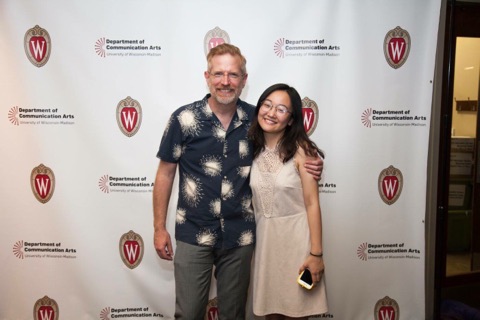
Like the exclusive TV and movie industry, telling the world’s stories in the form of videos instead of words makes up its own niche corner of the field. For that reason, the newer video department of UW-Madison’s newspaper The Badger Herald, an independent student newspaper and nonprofit business telling stories of the UW-Madison community, plays a special role.
Considering video journalism opportunities like The Badger Herald’s fall under such a specific category, how should students pursue them? For senior Violet Jinqi Wang, video director of The Badger Herald, working your way up from nothing solves this problem. For Wang, after finishing Comm Arts 355 and 467 (which include video production elements) she finally had work to show the video director of The Herald at the time. Having this portfolio earned her the starting role of associate director. From there she worked her way up to the role of video director. With videos covering topics such as Black History Month and the international student experience, she gets to share a lot of different voices from people of diverse backgrounds. “The true way to learn how to do something is just to do it,” Wang explains. “The only way to learn how to do video journalism is to actually go out and shoot a video.” If you have a passion for something, go for it and you’ll end up surprising yourself.
5. Ryan McMurtry ‘18 – Chapter Chair of American Society of Mechanical Engineers (ASME)

With so many students entering the field of mechanical engineering, how do newbies snag work experience? The American Society of Mechanical Engineers solves this problem by creating a professional community offering internships, academic help, industry connections and full-time work experience to engineering students. Senior Ryan McMurtry not only runs general organization meetings but also connects the chapter with its necessary industry resources. By reaching out to professionals, he secures events such as the appearance of the Oshkosh Corporation, a company that designs and constructs specialty access equipment and trucks. “I had an idea of where I wanted to see the org grow and develop in the future, and being chair would enable me to enact those policies. We have a lot of resources we could open up more,” he said. Expanding ASME’s contact network to allow for more speakers such as the Oshkosh Corporation could give students an insight into what they could end up doing for a living.
McMurtry has also changed the organization by crossing ASME with the Society of Women Engineers. Socials and joint meetings benefit both organizations by expanding each of their contact networks. As the leader of ASME, McMurtry’s desire to link similar orgs shows how much of an impact he has on the student body. And as the UW-Madison ambassador for ASME, his power to reach out to industry professionals could end up kick-starting a student’s whole career.
6. Morgan Kemp ‘18 – Chapter President of Society of Women Engineers (SWE)

Engineering may at first look like a looming fortress to hopeful female engineers. However, this professional networking organization, which encourages women to continue in the field, offers resources such as a mentorship program, speaker conferences and scholarships to its members to encourage them to follow their dream. SWE aims to see more women in all STEM fields and more girls showing interesting in science, engineering and math.
Senior Morgan Kemp promotes recruitment, oversees the group’s national-regional relationship and keeps members connected to the professional world through organizing and running networking events. As the head, Kemp has the power to change women’s impressions of the industry and slowly but surely fix that gender gap. Her role means much more than what first meets the eye. She also serves as an activist and advocate. Promoting the group through events such as UW-Madison’s annual Student Organization Fair makes sure freshmen recognize the club as an option from Day One. This allows women to make the most out of their potential during all four college years. “I wanted to make sure other girls out there had support,” Kemp said. “[STEM for women] is possible, and anyone can do it as long as they have a support system.”
7. Jennifer Torner ’18 – Chapter Co-Founder and President of Girl-Up

With gender discrimination holding back many girls from success in the workplace, Girl-Up—which advocates and fundraises for girls’ safety, health and education—offers prospective students financial opportunities they would not otherwise have. Senior Jennifer Torner, chapter co-founder and president, sets up meetings and outreach. As a new branch of an organization with a growing internal structure, the UW-Madison group of Girl-Up sets up a new atmosphere around women empowerment by targeting a young audience. “Our focus is to build that base,” Torner explained. “Fundraising can come more easily with more people.”
With the new fundraising campaign School Cycle, the team currently works to provide bikes and basic maintenance training to girls in countries such as Malawi, where the 10-mile long round-trip to school could discourage many from the pursuit of learning. Education and empowerment, Torner stressed, are vital from a young age, and the same holds true for systematic change. This drives Torner to keep going with the organization every day. Helping girls will also help to make stronger women.
8. Lexi Desrochers ‘18 – Chapter President of Women in Business

To combat the sexism and stereotypes in the business industry, Women in Business offers resources and networking opportunities through weekly speaking events that gather almost 100 female students studying business. It also provides on-site visits to companies from San Francisco to New York City and an academic mentorship program between upperclassmen and underclassmen. Senior Lexi Desrochers organizes these networking opportunities for the group. Starting as banquet director her sophomore year, she worked her way up the ladder one rung at a time until she was elected to lead. The knowledge that she’d help new girls grow and connect to more experienced upperclassmen gave her more than enough motivation to apply. “I wanted to give back to the organization [that] helped me grow into the person I am today,” Desrochers said. “I admired and looked up to the older girls when I was a new member, and I hope to be a role model for some of the new members and help connect them to the group of like-minded, motivated women that make up WIB.”
9. Jazmin Vargas ‘18 – Chapter Co-Founder and Treasurer of DREAMERS

With the recent repeal of DACA, the lack of support toward achieving higher education and citizen status has only grown tenfold. The UW-Madison chapter of DREAMERS, which helps students protected by the DREAM Act navigate the college application scene, brings attention to discrimination in the college admissions process. DREAMERS also offers guidance to its members, helping to build a whole new sense of community for those who may feel abandoned by the country they grew up in.
As chapter co-founder and treasurer of DREAMERS, junior Jazmin Vargas aims to create more resources for students facing these challenges. “Back in the spring of 2016 the three other founders and I noticed that there [were] no resources or space on campus for undocumented students,” Vargas said. “With that we saw the need to create such a space.” With a current fundraiser in progress, the DREAMERS team plans to launch a scholarship for undocumented students this spring. By creating a platform for otherwise ignored students, Vargas not only works as a leader but also as a trailblazer. “I would definitely say that leadership roles go beyond a personal gain,” she emphasized. “The choices we make as leaders have an impact on others in different ways that sometimes we do not notice.”
10. Katrina Morrison’18 – Chair of Associated Students of Madison (ASM)

Associated Students of Madison, or UW-Madison’s student representation in the university’s legislative branch, works to factor in student perspectives when making administrative decisions by advocating and fighting for student needs—and especially that of minority representation. Senior Katrina Morrison meets with administrators, organizes the annual operating budget for activities and brings student initiatives to life. With a deep passion for helping marginalized groups, Morrison aims to make the UW-Madison community more welcoming through programs such as Our Wisconsin, an inclusion program that she recently co-founded. Our Wisconsin teaches students skills such as how to identify bias and talk about diversity in a constructive way.
As a social activist fighting not only for the needs of students but also specifically for those of minorities, Morrison has the power to change entire perspectives on race, inclusion and culture on a mainly white campus. “[White students] can try to educate themselves on issues that marginalized students are facing, not just in the nation but also on campus,” Morrison explained. “And try to be an ally to marginalized students in those fights. Being an ally could be as small as a Facebook post to taking on an initiative that marginalized students are actually pushing for.”
Leaders make their voices heard, so put yours out there. Whether that voice pushes for social activism or lends a helping hand to underclassmen, let people know what you want, don’t fear what you haven’t tried and know that passion will easily equate to power if you only let it.
How to Make Your Voice Heard at UW-Madison
“Don’t be scared to make the commitment. When you put your passions into something, you’ll get it done and it’ll be rewarding.” – Katuszonek.
“Show interest. Show you’re dedicated to doing whatever you want to accomplish. Ask questions, show up, be there, be present. It’s one thing saying, ‘what can I do to help?’ but actually showing up and being there is a lot different.” – Kyriakakou
“It’s going to be terrifying sometimes and you’re not always going to know if you’re doing things right. Not everything is going to be a raging success right away, but you have to be persistent.” – Torner
“[D]on’t let a ‘no’ stop you [from] trying again – success may not come right away, but that doesn’t mean it won’t come at all. Be persistent and be your own best advocate on why you deserve the role.” – Desrochers

